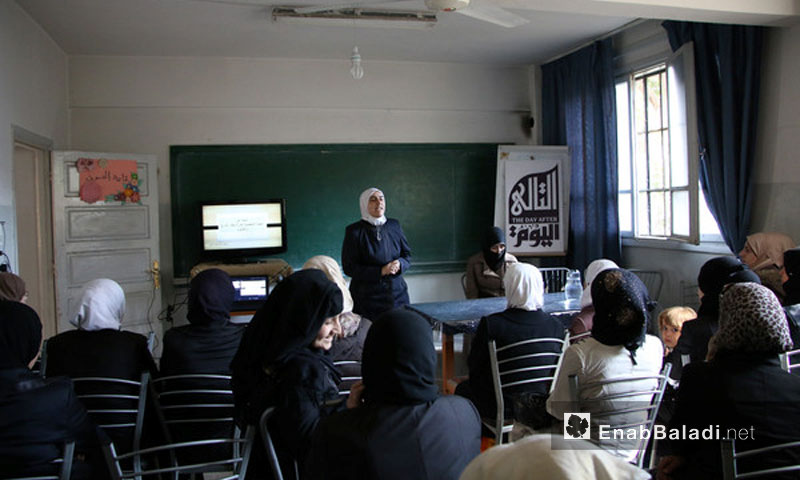Dima, 35 years old, attended the first lecture of the legal and political awareness campaign for women in Eastern Ghouta; she went there to gain a new sort of knowledge.
The lecture is one in a series, which the town of Kafr Batna hosts sponsored by “The Day After” Organization (TDA). The sessions started on Thursday, November 9, to end on the 19th day of the same month.
The lecture focused on introducing the rules on engagement and the certificate of marriage, according to what Dima told Enab Baladi. She learned rulings that she did not know before, stressing that she “perceived that the number of the attendees increased with each subject raised.” Manal, a member of the Women’s Office in the town, agreed.
Manal saw that the lectures “are important because they clearly tell us about our rights and duties according to religion and law.”
“We raised the subject of polygamy for the first time, and we discussed it with pleasure and obtained the desired benefit,” she said.
The campaign began under the title “An Overview of the Personal Life of Women in the Light of Shari’ah and the Law.” Five axes were adopted: The marriage certificate, the corresponding duties, and the rights of the spouses, the dissolution of the certificate, women and politics, as well as the importance of office work in the local councils.
Enab Baladi has covered the different campaigns which “The Day After” has been lately running in the city of Duma.
Thaer Hijazi, the Organization’s communication officer, said that the campaign emerges “as the result of the important role of the Organization after it had run a number of beneficial campaigns.”
Hijazi said that telling women that they have the right to run for elections “achieved great results”.
“Today, there are nine women in Duma’s Local Council after a series of open quality activities in Ghouta,” he added.
According to the communication officer, the attendance rate in the first session was not good. However, the number of women attending the meeting differed in the following sessions for there were more than 35 women attendees.
He called for the activation of women’s offices in the councils, “effectively and not apparently to attract support,” and called for increasing the activities, especially those relating to legal matters. He stressed that “We can help a woman overcome all the difficulties facing her by jurists working in the organization.”











